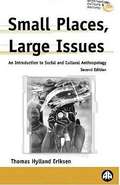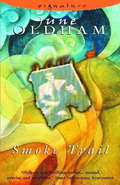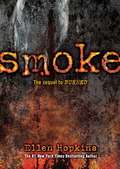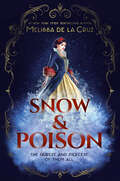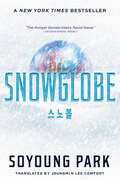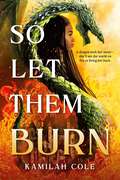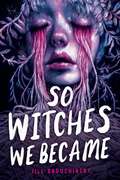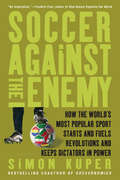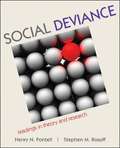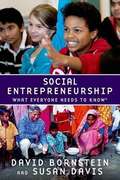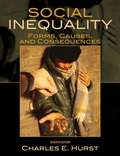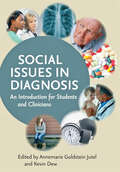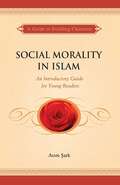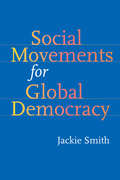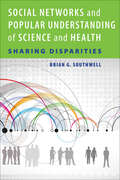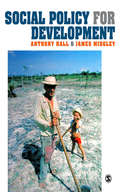- Table View
- List View
Small Gas Engines: Fundamentals, Service, Troubleshooting, Repair, Applications (9th Edition)
by Alfred C. RothSmall Gas Engines provides practical information about the construction and operation of small two- and four-cycle gasoline engines. Detailed information about specific maintenance, lubrication, troubleshooting, service, rebuilding, and repair is presented. The text is written in clear, nontechnical language and includes information that is invaluable to anyone interested in servicing small gas engines.
Small Gas Engines: Fundamentals, Service, Troubleshooting, Repair, Applications (Tenth Edition)
by Alfred C. Roth W. Scott Gauthier Blake FisherThe Small Gas Engines Workbook includes a variety of questions, in various formats, to help reinforce the student's understanding of the material presented in the textbook chapters. Step-by-step jobs in the Workbook guide the students through important engine service procedures. The Workbook also includes sample Equipment & Engine Training Council (EETC) technician certification tests for the four-stroke and two-stroke areas of certification. These tests help the students prepare for EETC certification.
Small Places, Large Issues: An Introduction to Social and Cultural Anthropology (2nd edition)
by Thomas Hylland EriksenThis is a new edition of an introductory anthropology textbook for undergraduates. Eriksen (social anthropology, U. of Oslo) focuses on such central topics as kinship, ethnicity, ritual, and political systems, and offers examples that demonstrate the scope of anthropology and the basic approaches of the discipline. Annotation c. Book News, Inc., Portland, OR (booknews.com)
Smile and Say Murder (Nancy Drew Files #4)
by Carolyn KeeneIn the glitzy world of magazine publishing, Nancy Drew searches for a ruthless killer. A series of death threats send Nancy undercover at Flash, the country’s top teen magazine. The target is Yvonne Verdi, coowner of Flash and wonder-girl of the magazine world.
Smoke Trail
by June OldhamCora lives with her mother and grandmother in a hamlet in the Yorkshire dales. The three are close, but Cora longs to meet her father, whom she has never seen. She likens him to an unknown man who is reported to have disappeared - 'vanished in a puff of smoke'. Chance events lead Cora to build a fantasy that, in the past, her father has come back to the neighbourhood in order to contact her. A burnt-out car on the moor; burglaries; stolen food - all convince her that her father is nearby and wants to meet her. But the moor is prohibited, and to search for him she has to ignore her loyalty to her mother and grandmother, the warnings given by her mother about her father, and the sensible caution of her friend, Emma ...
Smoke: Quantity Pack (Burned #2)
by Ellen HopkinsPattyn&’s father is dead. Now she&’s on the run in this riveting companion to New York Times bestseller Burned, which Kirkus Reviews calls &“a strong, painful, and tender piece about wresting hope from the depths of despair.&”Pattyn Von Stratten’s father is dead, and Pattyn is on the run. After far too many years of abuse at the hands of her father, and after the tragic loss of her beloved Ethan and their unborn child, Pattyn is desperate for peace. Only her sister Jackie knows what happened that fatal night, but she is stuck at home with their mother, who clings to normalcy by allowing the truth to be covered up by their domineering community leaders. Her father might be finally gone, but without Pattyn, Jackie is desperately isolated. Alone and in disguise, Pattyn starts a new life as a migrant worker on a California ranch. But is it even possible to rebuild a life when everything you’ve known has burned to ash and lies seem far safer than the truth? Bestselling author Ellen Hopkins continues the riveting story of Pattyn Von Stratten she began in Burned to explore what it takes to rise from the ashes, put ghosts to rest, and step into a future.
Snow & Poison
by Melissa de la CruzLove is stronger than poison in this lush retelling of "Snow White" by #1 New York Times bestselling author Melissa de la Cruz.Known as Snow White, Lady Sophie has led a sheltered life in the mountains of Bavaria. Until now. Her father, the widowed Duke Maximilian, is at last remarrying, and on the day of his historic wedding, Sophie is making her high-society debut.At the ball, Sophie charms the dashing Prince Philip, heir to the Spanish throne. But as Philip and Sophie start falling deeply in love, the king of Spain loses his temper. His wish is that Philip would marry a princess. And now, his command is Sophie&’s death.In a quest for survival, Sophie seeks refuge in the home of seven orphans, the counsel of a witch, and the safety of her blade. With the looming threat of war upon her duchy, Sophie must ponder: Can she do right by her home and honor her heart&’s desire?"[A] beguiling historical fantasy." —Publishers Weekly
Snow in Love (Point Ser.)
by Aimee Friedman Kasie West Nic Stone Melissa de la CruzPerfect for fans of Let It Snow, this irresistible collection of wintry love stories is guaranteed to bring on the warm fuzzies.What's better than one deliciously cozy, swoon-worthy holiday story?Four of them, from some of today's bestselling authors.From KASIE WEST, a snowy road trip takes an unexpected detour when secrets and crushes are revealed.From AIMEE FRIEDMAN, a Hanukkah miracle may just happen when a Jewish girl working as a department store elf finds love.From MELISSA DE LA CRUZ, Christmas Eve gets a plot twist when a high school couple exchange surprising presents.From NIC STONE, a scavenger hunt amid the holiday crowds at an airport turns totally romantic.So grab a mug of hot cocoa, snuggle up, and get ready to fall in love...
Snowglobe (The Snowglobe Duology #1)
by Soyoung ParkNEW YORK TIMES BESTSELLER • The groundbreaking Korean phenomenon that Entertainment Weekly called &“The Hunger Games meets Squid Game&”—now in English for the first time!A COSMOPOLITAN BEST YOUNG ADULT BOOK OF THE YEAR • A KIRKUS REVIEWS BEST BOOK OF THE YEAR&“An immersive and utterly addictive dark dystopian thriller . . . with the eerie, desperate, and exhilarating vibes of Snowpiercer and The Hunger Games.&” —Susan Lee, author of SeoulmatesIn a world of constant winter, only the citizens of the climate-controlled city of Snowglobe can escape the bitter cold—but this perfect society is hiding dark and dangerous secrets within its frozen heart.Enclosed under a vast dome, Snowglobe is the last place on Earth that&’s warm. Outside Snowglobe is a frozen wasteland, and every day, citizens face the icy world to get to their jobs at the power plant, where they produce the energy Snowglobe needs. Their only solace comes in the form of twenty-four-hour television programming streamed directly from the domed city.The residents of Snowglobe have everything: fame, fortune, and above all, safety from the desolation outside their walls. In exchange, their lives are broadcast to the less fortunate outside, who watch eagerly, hoping for the chance to one day become actors themselves.Chobahm lives for the time she spends watching the shows produced inside Snowglobe. Her favorite? Goh Around, starring Goh Haeri, Snowglobe&’s biggest star—and, it turns out, the key to getting Chobahm her dream life.Because Haeri is dead, and Chobahm has been chosen to take her place. Only, life inside Snowglobe is nothing like what you see on television. Reality is a lie, and truth seems to be forever out of reach.Translated for the first time into English from the original Korean, Snowglobe is a groundbreaking exploration of personal identity, and the future of the world as we know it. It is the winner of the Changbi X Kakaopage Young Adult Novel Award.
So Let Them Burn (The Divine Traitors #1)
by Kamilah ColeAn INSTANT National Bestseller! Whip-smart and immersive, this Jamaican-inspired fantasy follows a gods-blessed heroine who&’s forced to choose between saving her sister or protecting her homeland—perfect for fans of Iron Widow and The Priory of the Orange Tree. Faron Vincent can channel the power of the gods. Five years ago, she used her divine magic to liberate her island from its enemies, the dragon-riding Langley Empire. But now, at seventeen, Faron is all powered up with no wars to fight. She&’s a legend to her people and a nuisance to her neighbors. When she&’s forced to attend an international peace summit, Faron expects that she will perform tricks like a trained pet and then go home. She doesn&’t expect her older sister, Elara, forming an unprecedented bond with an enemy dragon—or the gods claiming the only way to break that bond is to kill her sister. As Faron&’s desperation to find another solution takes her down a dark path, and Elara discovers the shocking secrets at the heart of the Langley Empire, both must make difficult choices that will shape each other&’s lives, as well as the fate of their world. "By turns hopeful and devastating, So Let Them Burn is a masterful debut with a blazing heart. I was captivated from beginning to end by Cole&’s sharp, clever prose and by her protagonists—two remarkable sisters with an unforgettable bond." — Chelsea Abdullah, author of The Stardust Thief
So This Is Ever After
by F.T. LukensAn instant New York Time bestseller! Carry On meets Arthurian legend in this subversive, &“delightfully original and whimsical&” (Kirkus Reviews) young adult fantasy about what happens after the chosen one wins the kingdom and has to get married to keep it…and to stay alive.Arek hadn&’t thought much about what would happen after he completed the prophecy that said he was destined to save the Kingdom of Ere from its evil ruler. So now that he&’s finally managed to (somewhat clumsily) behead the evil king (turns out magical swords yanked from bogs don&’t come pre-sharpened), he and his rag-tag group of quest companions are at a bit of a loss for what to do next. As a temporary safeguard, Arek&’s best friend and mage, Matt, convinces him to assume the throne until the true heir can be rescued from her tower. Except that she&’s dead. Now Arek is stuck as king, a role that comes with a magical catch: choose a spouse by your eighteenth birthday, or wither away into nothing. With his eighteenth birthday only three months away, and only Matt in on the secret, Arek embarks on a desperate bid to find a spouse to save his life—starting with his quest companions. But his attempts at wooing his friends go painfully and hilariously wrong…until he discovers that love might have been in front of him all along.
So Witches We Became
by Jill Baguchinsky★ "Skillfully crafted and sharply descriptive with horrifying imagery to spare... Powerfully angry and vengeance-laden, with terrifying and very human monsters." –School Library Journal, starred reviewA queer, feminist spin on Stephen King&’s The Mist, this ode to female-rage is a perfect pick for fans of She Is a Haunting, and a reminder that if "boys will be boys", girls will fight back. For high school senior Nell and her friends, a vacation house on a private Florida island sounds like the makings of a dream spring break. But Nell brings secrets with her—secrets that fuse with the island's tragic history, trapping them all with a curse that surrounds the island in a toxic, vengeful mist and the surrounding waters with an unseen, devouring beast. Getting out alive means risking her friendships, her sanity, and even her own life. In order to save herself and her friends, Nell will have to face memories she'd rather leave behind, reveal the horrific truth behind the encounter that changed her life one year ago, and face the shadow that's haunted her since childhood. Easier said than done. But when Nell's friends reveal that they each brought secrets of their own, a solution even more dangerous than the curse begins to take shape. Reading like a YA feminist spin on Stephen King&’s The Mist, So Witches We Became is a diverse, queer horror about female friendship, the emotional aftermath of surviving assault, and how to find power in the shadows of your past. Step into your witchy power or be swallowed by the curse–the choice is yours.
So You Think You Know: The Olympics
by Clive GiffordSo you think you all about the Olympics? Have a go at these:Which country's population was granted a day's holiday when its men's football team won gold at the 2000 Olympics?At the 2012 games, only two stadiums used for the football events are Premier League grounds. Can you name both?Name one of the three sports that George Eyser, a man with a wooden leg, won at the 1904 Olympics.Whether you want to test your knowledge or are keen to learn more about the biggest sporting event EVER, here are over 1000 Olympic teasers that cover everything from the history of the games and sports knowledge to weird and wonderful trivia that will put even gold medallists to the test and will make sure that you're ready for this summer's Olympics!
So You Wanna Be A Pop Star?: A Choices Novel
by Zachary SergiAn energetic, interactive YA novel about five solo pop artists navigating drama, finding their sound, and discovering what it truly takes to chase their dreams of music stardom after being forced into a pop group together. Everly Brooks knows she has what it takes to be the next big singer-songwriter. At least, that's if she could get her onstage presence to stop feeling so wooden and blossom like her rich, moving lyrics. The reality signing competition, SO YOU WANNA BE A POP STAR? is her chance at proving to the world—and herself—that her talent and artistry can mean something more than just live streams and online videos. Vinny Vecchi thought he was heading toward a life full of makeup, wigs, and werking it on the drag stages of NYC. But a powerful diva voice is a precious thing to waste and, in need of money to make his drag dreams come true, SO YOU WANNA BE A POP STAR? is the next best thing. However, surrounded by competitors with clear brands and sharpened musical identities, he wonders if he can break through while still discovering himself. When a group performance on the show goes viral overnight, Everly and Vinny find their careers unexpectedly tied together. Along with their competitors—influencer Dea Seo, pop-punk CeCe Winnifred, and heartthrob Stern Green—these five artists are forced to become the newest pop super group: Jeweltones. You, the reader, get to make choices that will make or break Everly, Vinny, and the group&’s meteoric rise in this interactive novel. Will you mend the cracks to help Jeweltones shine bright, or will they burn out under pressure? The choices are yours to make!
So, This Is Love
by Tracy AndreenIn the sequel to Tracy Andreen's debut romantic comedy So, This Is Christmas, we follow Finley and Arthur back to Barrington Academy for a swoony semester.Perfect for fans of Tell Me Three Things and Anna and the French Kiss!Finley and Arthur are back at boarding school and neither quite knows where the other stands—are they couple? Are they not a couple? What does one magical Christmas Eve kiss in Oklahoma mean for their relationship status? This confusion isn't helped by the re-entry of old enemies into their school lives, especially ones that may or may not be crushing on Arthur. Finley is at a loss when navigating the complexities of her new (maybe) relationship, which could very well turn into love. . . if she doesn't blow it.So, This Is Love is a perfect read for the Valentine's Day season, or for anyone looking for a delightful romantic comedy that has just a dash of drama. Once again, Tracy Andreen has proven that no one writes a holiday rom-com like her.
Soccer Against the Enemy: How The World's Most Popular Sport Starts And Fuels Revolutions And Keeps Dictators In Power
by Simon KuperSoccer is much more than just the most popular game in the world. It is a matter of life and death for millions around the world, an international lingua franca. Simon Kuper traveled to twenty-two countries to discover the sometimes bizarre effect soccer can have on politics and culture. At the same time he tried to discover what makes different countries play a simple game so differently. Kuper meets a remarkable variety of fans along the way, from the East Berliner persecuted by the Stasi for supporting his local team, to the Argentine general with his own views on tactics. He also illuminates the frightening intersection between soccer and politics, particularly in the wake of the attacks of 9-11, where soccer is obsessed over by the likes of Osama bin Laden. The result is one of the world's most acclaimed books on the game, and an astonishing study of soccer and its place in the world.
Soccer's Off: Western Wildcats 1
by John LarkinThe Western Wildcats might appear to be a bunch of losers, but Paul and Eric Underwood?s father has come up with the formula for making them winners: they?ve got to start acting Brazilian. Everyone should wise up when he takes control of the weekend barbecue and almost burns the house down ? but they don?t, and it can only be hoped that he?s a better coach than he is a cook! First it?s out to the sandhills, where champion sprinter and nerdy older brother Eric (Spaghetti Legs) is going to put the Wildcats through their paces up and down the dunes. And if soccer?s not off after a workout like that, it won?t be his fault!
Social Deviance: Readings In Theory And Research
by Stephen M. Rosoff Henry N. PontellIn its first edition with McGraw-Hill, this comprehensive source of classic and contemporary readings will help students learn who becomes deviant, why people become deviant, and how individual and institutional reactions help define the social reality of deviants (the persons) and deviance (the behavior). The selected readings provide experiences for students by providing a solid foundation in the field and a means by which to examine contemporary issues.
Social Entrepreneurship: What Everyone Needs to Know
by David Bornstein Susan DavisOffering a first general overview of social entrepreneurship, it explains what social entrepreneurs are, how their organizations function, what challenges they face and an understanding of what differentiates social entrepreneurship from standard business ventures.
Social Inequality: Forms, Causes, And Consequences
by Charles E. HurstA broad introduction to inequality both nationally and internationally. This text is intended as a broad introduction to the many types of inequality in U. S. society and in the global setting. The authors provide a wide range of explanations on inequality and offering analyses of policy attempts to address these issues. The text provides data from the latest research in its discussions of economic, status, political, gender, sexual, and racial/ethnic inequalities.
Social Issues in Diagnosis: An Introduction for Students and Clinicians
by Annemarie Goldstein Jutel and Kevin DewUnderstanding the social process of diagnosis is critical to improving doctor-patient relationships and health outcomes.Diagnosis, the classification tool of medicine, serves an important social role. It confers social status on those who diagnose, and it impacts the social status of those diagnosed. Studying diagnosis from a sociological perspective offers clinicians and students a rich and sometimes provocative view of medicine and the cultures in which it is practiced. Social Issues in Diagnosis describes how diagnostic labels and the process of diagnosis are anchored in groups and structures as much as they are in the interactions between patient and doctor.The sociological perspective is informative, detailed, and different from what medical, nursing, social work, and psychology students—and other professionals who diagnose or work with diagnoses—learn in a pathophysiology or clinical assessment course. It is precisely this difference that should be integral to student and clinician education, enriching the professional experience with improved doctor-patient relationships and potentially better health outcomes.Chapters are written by both researchers and educators and reviewed by medical advisors. Just as medicine divides disease into diagnostic categories, so have the editors classified the social aspects of diagnosis into discrete areas of reflection, including• Classification of illness• Process of diagnosis• Phenomenon of uncertainty• Diagnostic labels• Discrimination• Challenges to medical authority• Medicalization• Technological influences• Self-diagnosisAdditional chapters by clinicians, including New York Times columnist Lisa Sanders, M.D., provide a view from the front line of diagnosis to round out the discussion. Sociology and pre-med students, especially those prepping for the new MCAT section on social and behavioral sciences, will appreciate the discussion questions, glossary of key terms, and CLASSIFY mnemonic.
Social Morality in Islam: An Introductory Guide for Young Readers
by Asim SarkA believer reads to retain his liveliness. The readings will be constant and regular. For those who share the same goals, coming together and discussing books will increase the benefits. Those people who renew themselves and strengthen their faith within the written word will be firmer in their resistance against withering.Reading works that will make one closer to Allah the Almighty is praiseworthy. Even more commendable is to take one's reading beyond theory by seeking ways to bring one's knowledge into practice, for one's servanthood depends on daily improving one's performance. The essence of knowledge is practice, and its purpose is to come closer to the All-Compassionate.&“Islam is high morality&” says Prophet Muhammad, peace and blessings be upon him. The Messenger of Allah, who is a paragon of virtue, prefers people with good manners. This book, which is an introductory guide for young readers, focuses on the necessity of acquiring fine morals, the rights of parents, honesty, and etiquettes and manners in social relations.
Social Movements for Global Democracy (Themes in Global Social Change)
by Jackie SmithHonorable Mention, 2010 Book Award, Global Division, Society for the Study of Social ProblemsHonorable Mention, 2010 PEWS Book Award, Political Economy of the World-System section of the American Sociological AssociationThis groundbreaking study sheds new light on the struggle to define the course of globalization. Synthesizing extensive research on transnational activism, Social Movements for Global Democracy shows how transnational networks of social movement activists—democratic globalizers—have worked to promote human rights and ecological sustainability over the predominant neoliberal system of economic integration.Using case studies of recent and ongoing campaigns for global justice, Jackie Smith provides valuable insight into whether and how these activists are succeeding. She argues that democratic globalizers could be more effective if they presented a united front organized around a global vision that places human rights and ecological stability foremost and if they were to directly engage governments and the United Nations.Illuminating the deep-seated struggles between two visions of globalization, Smith reveals a network of activists who have long been working to democratize the global political system.
Social Networks and Popular Understanding of Science and Health: Sharing Disparities
by Brian G. SouthwellA data-driven analysis of how different people share information about health through social media.Using social media and peer-to-peer networks to teach people about science and health may seem like an obvious strategy. Yet recent research suggests that systematic reliance on social networks may be a recipe for inequity. People are not consistently inclined to share information with others around them, and many people are constrained by factors outside of their immediate control. Ironically, the highly social nature of humankind complicates the extent to which we can live in a society united solely by electronic media.Stretching well beyond social media, this book documents disparate tendencies in the ways people learn and share information about health and science. By reviewing a wide array of existing research—ranging from a survey of New Orleans residents in the weeks after Hurricane Katrina to analysis of Twitter posts related to H1N1 to a physician-led communication campaign explaining the benefits of vaginal birth—Brian G. Southwell explains why some types of information are more likely to be shared than others and how some people never get exposed to seemingly widely available information.This book will appeal to social science students and citizens interested in the role of social networks in information diffusion and yet it also serves as a cautionary tale for communication practitioners and policymakers interested in leveraging social ties as an inexpensive method to spread information.
Social Policy for Development
by James Midgley Anthony Hall'Strong social policy is essential for sustainable growth. This book is an extremely useful overview of social policy issue for policy makers and anyone who wants to understand the true roots of successful sustainable development' - Ian Johnson, Vice President for Sustainable Development, The World Bank 'Throughout the world issues of social development have now taken centre stage. There is no more comprehensive and readable guide to the choices and conflicts of this global drama. This book is essential reading for all students and practitioners of social development - and for every World Bank economist' - David Piachaud, Professor of Social Policy, London School of Economics This much-needed textbook fulfils a major gap in providing a complete up-to-date guide and introduction to the increasingly important role of social policy in the context of development processes and practice. Across a number of key sectors and areas of social policy concern, the authors accessibly introduce and explain the main conceptual debates, the most recent policy discussions, and provide applied examples to illustrate the latest developments in the social policy and planning field. Central topics covered include: - poverty - rural development - urban development - education - health - social work - social welfare - international development and cooperation. Social Policy for Development is an essential text for all students and practitioners alike seeking a deeper understanding of the issues of poverty, social exclusion and deprivation across social policy and development studies internationally.


